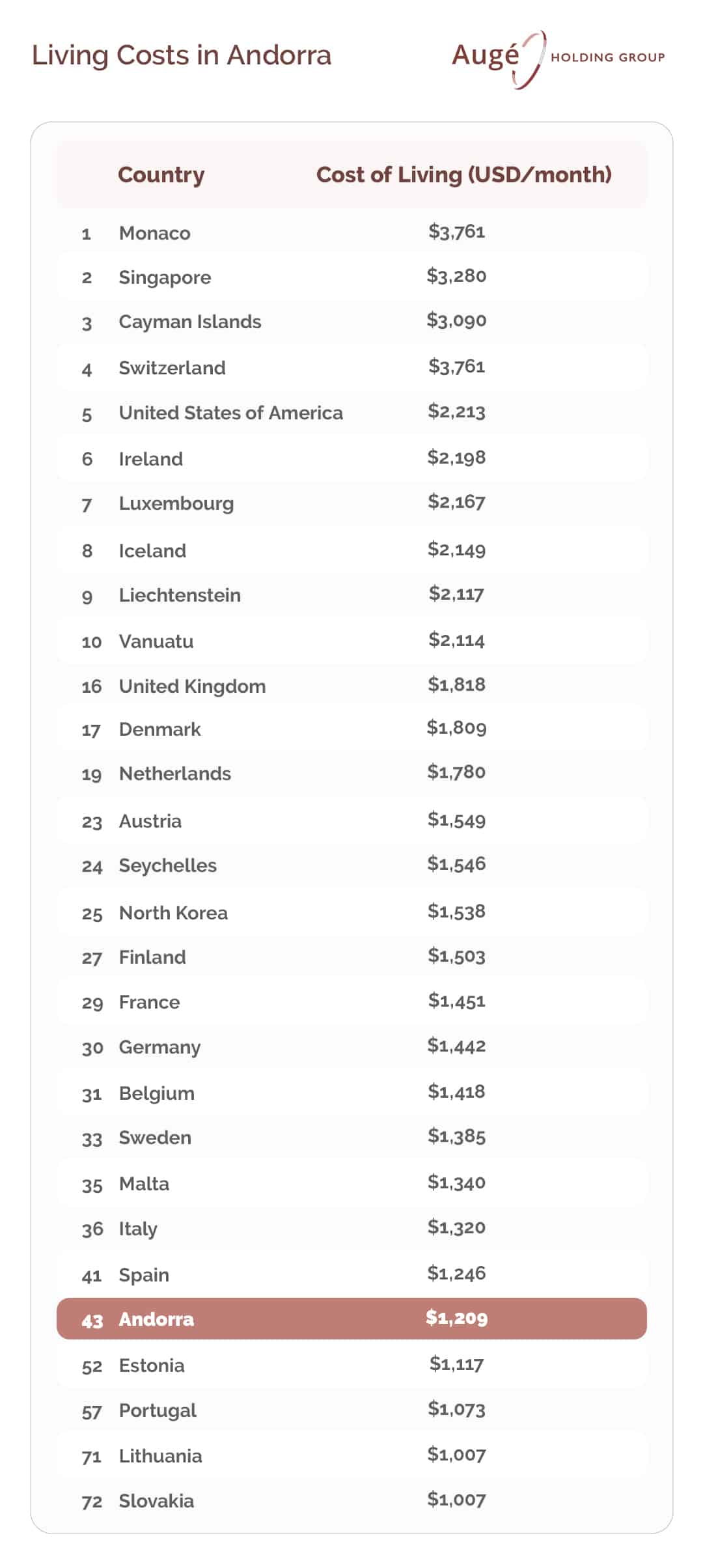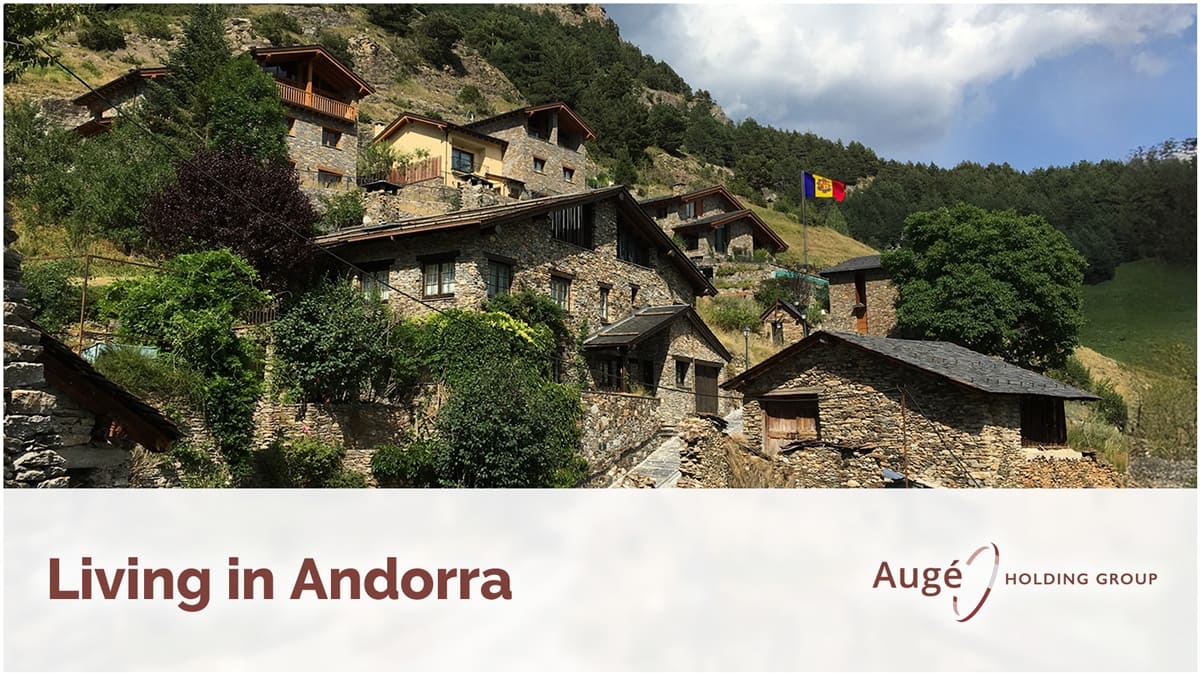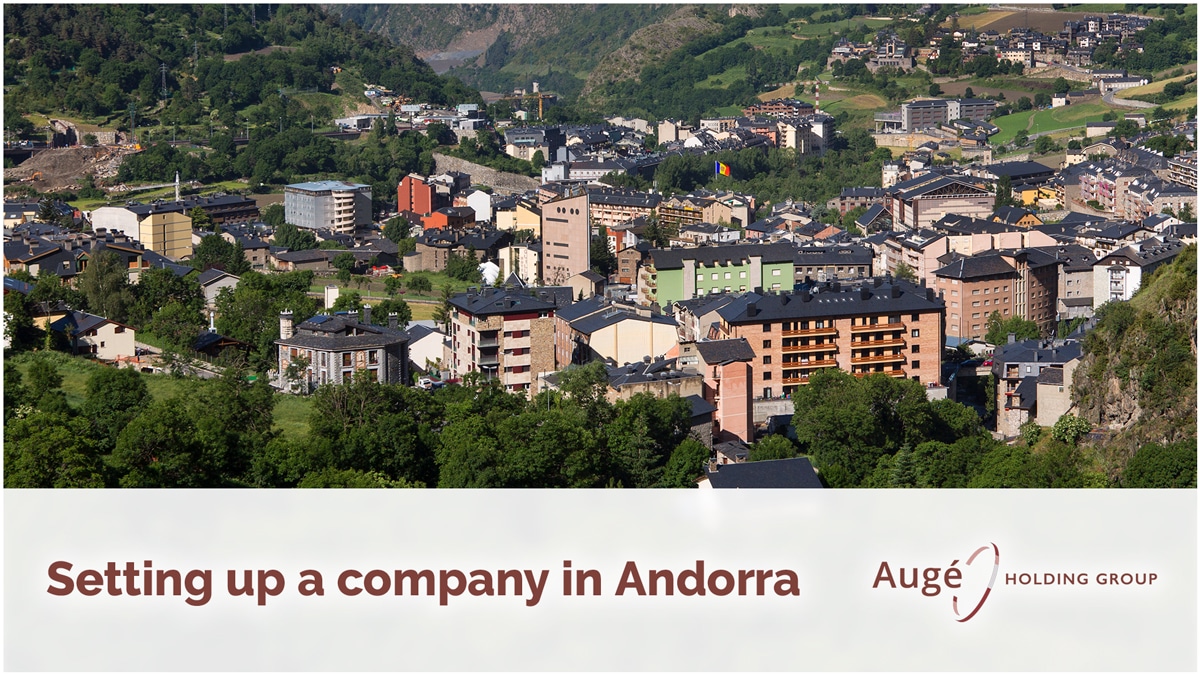Andorra is a small principality located amidst the Pyrenees, between the borders of France and Spain. Its surface only covers 468km2, making it one of the smallest countries in Europe. But its compact size does not prevent it from offering a high quality of life. Its capital, Andorra la Vella, is the economic and cultural centre of the country, surrounded by breathtaking mountain scenery and a unique natural environment.
With around 100,000 inhabitants, Andorra is an independent country that is not part of the European Union or the European Economic Area. However, it is a signatory to bilateral and multilateral international agreements on matters as diverse as the defence of human rights, the exchange of banking information, social security and taxation, among others.
Throughout its history, Andorra has seen a clash of cultures, with Catalan, French and Spanish influences. Although Andorra is one of the oldest sovereign countries, with more than 700 years of uninterrupted history, it has never had an army or experienced a war on its territory. It is a historically neutral country, unique in the world and welcoming, where citizens of more than 100 nationalities live together peacefully.
The country has a political system of co-principality, where the President of France and the Bishop of Urgell of Spain are co-princes, a distinctive feature that reflects the history of collaboration between nations.
The capital of Andorra is Andorra la Vella and is set 1,022 metres above sea level, which makes it the highest state capital in Europe.
The most widely spoken language in Andorra is Spanish, although French, English, Portuguese and Catalan are also spoken, the latter being the country’s official language.
Living in Andorra offers numerous advantages. On the fiscal side, Andorra is known for having a very favourable tax regime, with a personal income tax rate of 10% and no wealth and inheritance taxes.
In addition, the country has an excellent quality of life and is a safe place, with an efficient healthcare system, quality public services and a natural environment that allows outdoor activities to be enjoyed all year round, such as skiing in winter and hiking in summer. All this makes Andorra an ideal choice for those seeking a quiet lifestyle and certain tax benefits.
Table of contents
ToggleLegal requirements to live in Andorra
Living in Andorra offers numerous advantages, both in terms of taxation and quality of life, but to enjoy these benefits, some legal requirements must be complied with. The process for obtaining residency in Andorra involves demonstrating a link to the country, whether through employment, investment, or economic activities. If you want to live in Andorra, you need to gather certain documents for the application process, and meet certain financial requirements.
What documents do you need to make the request?
To apply to live in Andorra, a series of documents are necessary depending on the type of residence you are applying for. Whether you are looking for active or passive residence, there are certain documents that are common:
- Medical report certifying that you are in good health and have no serious illnesses.
- Valid passport or identity card legalised by the Hague Apostille.
- A legalised or apostilled criminal record certificate.
- Proof of current residence in your home country through bills or rental contracts.
- International health insurance or health insurance operating in Andorra.
Once you have gathered all these documents, you can start the application to live in Andorra.
Financial requirements
Among the requirements for living in Andorra as a foreign citizen, it may be necessary to include financial documents, which vary depending on the type of residence requested.
In the case of passive residence, you must demonstrate financial solvency through documents such as bank statements, income declarations or proof of assets. The government will require that the applicant’s income can cover his or her needs and those of his or her family members, without relying on public assistance.
For active residence, in addition to having a job, it is also necessary to prove that the income you generate is sufficient to support you and your family, if it were necessary. The minimum varies according to your personal situation but is usually around €30,000 annually.
Application process
The application process to live in Andorra involves several steps. First, you must choose the type of residency: if you are going to work in the country, you must select active residence, while if you do not have an active work activity, you must opt for passive residence.
Next, gather the necessary documents mentioned above, such as a valid passport, a criminal record certificate, proof of financial solvency and medical insurance to cover you during your stay in Andorra.
Once the documentation is complete, you must submit the application online at the Andorran government’s official website or in person at the Andorran government’s Migration Department. You must also prove that you meet the residency requirements, such as spending more than 183 days a year in the country and having a place of residence. If your application is approved, you will get a residency permit.
The process can take between 1 and 6 months, depending on the type of application and the documents submitted.
Types of residency
If you want to live in Andorra you have to take into account that there are three types of applications adapted to different needs and situations.
We can find the active residence, which you must apply for if you want to work in Andorra. For this you need a work contract or to be self-employed, proving that the income you generate is sufficient to cover the cost of living in the country.
On the other hand, there is passive or non-profit residence, for people who wish to live in Andorra without working in the country, such as investors, retirees or professionals who work remotely. In order to apply for it, you must prove that you have economic solvency.
Finally, we find the residence for students, which allows international students to live in Andorra while they are enrolled in an educational institution in the country, complying with its economic requirements.
To obtain tax residency in Andorra in any of the three options, you must have a minimum of 183 days of demonstrable residence in the country and be financially solvent.
What is the cost of living in Andorra?
The cost of living in Andorra is generally lower than in many European countries, especially in terms of taxes. However, housing prices can be somewhat higher, both for renting and buying. While basic expenses, such as health care and education, are of high quality and affordable.

Housing
Living in Andorra has a cost that varies depending on the location and the type of property you wish to own. In the most sought-after areas, such as Andorra la Vella, Escaldes-Engordany and Canillo, prices can be higher.
The average price of a one-bedroom flat in the centre of Andorra la Vella can be between 1,800 and 2,500 euros per square metre, while in more peripheral areas prices can range between 1,500 and 2,000 euros per square metre.
If you want to buy a luxury home or a larger property, prices can exceed 3,000 euros per square metre in exclusive areas, such as the Incles Valley or Grandvalira.
When it comes to renting, a one-bedroom flat can cost between 700 and 1,200 euros per month, depending on location and amenities.
Healthcare and education
If you want to live in Andorra you’ll find that the cost of healthcare is quite affordable, thanks to its public health insurance system, known as CASS, the Andorran Social Security Fund.
All residents must be affiliated and coverage is quite extensive, including medical consultations, hospitalisation and surgery. The monthly cost of CASS varies according to income, but is generally between 5% and 10% of gross income, with a maximum of 400 euros per month for a high salary.
If you prefer private or complementary care, there are private health insurance providers that cover additional services or treatment outside the country, with prices varying according to the plan and coverage.
When it comes to education, you can rest assured that Andorra offers quality public education, with a trilingual system that includes learning Catalan, French and Spanish. Education in public schools is free, although there are some costs associated with it, such as school materials and extracurricular activities.
In addition, there are private and international schools, such as the Institut Andorra, which offer education in English, French or Spanish. Prices for private education can vary, ranging from 6,000 to 20,000 euros per year, depending on the institution and academic level.
In general, both health and education in Andorra are of high quality and at reasonable costs compared to other European countries, which makes living in Andorra an attractive option not only for its tax advantages, but also for the quality of life enjoyed by its inhabitants.
Basic expenses
If you live in Andorra, basic expenses, such as food, are similar in price to those in Spain and France, although imported products can be more expensive. Public transport is cheap, with bus fares starting at €1.50, as is the price of petrol, which is very competitive.
If you’re worried about the expense of leisure in Andorra, dining out or attending events is affordable and there are options to suit all budgets.
How is the quality of life in Andorra?
The quality of life you can have in Andorra compared to other countries is very high, as it is a safe, stable environment full of quality services. One of the most outstanding aspects is security, as Andorra is one of the safest countries in Europe, with a low crime rate and a peaceful and welcoming environment.
It has great social stability, due to its stable political system and solid economy based on tourism, trade and financial services.
The health system in Andorra is efficient and accessible, thanks to the Andorran Social Security Fund (CASS), which offers universal medical coverage to residents. Medical consultations, hospitalisation and treatment are of high quality, and care in private hospitals is excellent. In addition, the country has several health centres throughout the country, ensuring fast and efficient access to medical care.
In terms of education, Andorra offers a wide variety of both public and private options. Public schools have a trilingual system where children will learn Catalan, French and Spanish and public education is free of charge. In addition, there are international schools that offer classes in English or French, ideal for foreign families.
Families living in Andorra enjoy an ideal place to live, with services suitable for children and young people, parks, extracurricular activities and a natural environment perfect for children’s leisure and development.
In addition, Andorra is a paradise for outdoor enthusiasts, as you can practice a multitude of sports such as skiing, hiking and cycling. It also has quality facilities for sports and cultural events, guaranteeing an active and balanced lifestyle.
Practical tips for moving into Andorra
The time to organise a move can be chaotic, especially if it is to another country, so we are going to give you some tips to make the process more bearable and hassle-free.
Planning the move
If you have to plan a move from Spain, you should start by organising the necessary documentation to process your residence permit. At the same time, research the housing options available and choose the best location for your needs.
Contact an international removals company to take care of transporting your belongings.
Finally, make sure you have international health insurance or health insurance that operates in Andorra and that you meet the requirements of the Andorran Social Security Fund (CASS). It is also important to familiarise yourself with the education system and local services before you organise your move.
Adapting to the Andorran social and cultural life
When you move to another country it is essential to adapt to the new culture and social style of the nation you will be living in, including becoming familiar with the language; although Spanish is widely spoken in Andorra, the official language of the country is Catalan.
It is very useful to integrate into the local community by participating in social and cultural activities, to get to know the principality better and to forge links and bonds with new people.
If you like sports, Andorra offers a wide range of outdoor activities, such as skiing and hiking, which make it easy to meet people with similar interests.
Local resources and ex-pat communities
As a country that welcomes people from more than 100 nations around the world, mainly Spanish and French, it is easy to find forums, associations and other expatriate communities in Andorra, which can make it easier for you to adapt to life in the principality, as well as help you maintain your roots with your place of origin.





